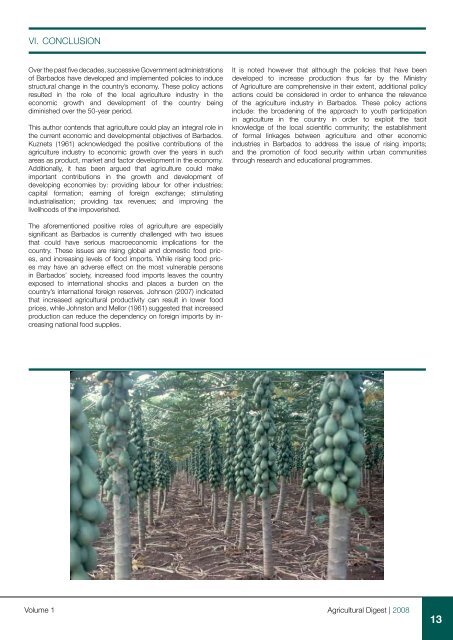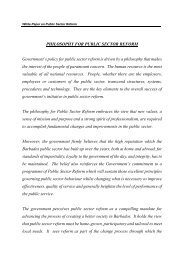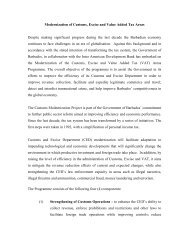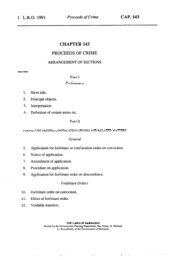The 2008 Agricultural Digest - Ministry of Agriculture and Rural ...
The 2008 Agricultural Digest - Ministry of Agriculture and Rural ...
The 2008 Agricultural Digest - Ministry of Agriculture and Rural ...
- No tags were found...
Create successful ePaper yourself
Turn your PDF publications into a flip-book with our unique Google optimized e-Paper software.
VI. CONCLUSIONOver the past five decades, successive Government administrations<strong>of</strong> Barbados have developed <strong>and</strong> implemented policies to inducestructural change in the country’s economy. <strong>The</strong>se policy actionsresulted in the role <strong>of</strong> the local agriculture industry in theeconomic growth <strong>and</strong> development <strong>of</strong> the country beingdiminished over the 50-year period.This author contends that agriculture could play an integral role inthe current economic <strong>and</strong> developmental objectives <strong>of</strong> Barbados.Kuznets (1961) acknowledged the positive contributions <strong>of</strong> theagriculture industry to economic growth over the years in suchareas as product, market <strong>and</strong> factor development in the economy.Additionally, it has been argued that agriculture could makeimportant contributions in the growth <strong>and</strong> development <strong>of</strong>developing economies by: providing labour for other industries;capital formation; earning <strong>of</strong> foreign exchange; stimulatingindustrialisation; providing tax revenues; <strong>and</strong> improving thelivelihoods <strong>of</strong> the impoverished.It is noted however that although the policies that have beendeveloped to increase production thus far by the <strong>Ministry</strong><strong>of</strong> <strong>Agriculture</strong> are comprehensive in their extent, additional policyactions could be considered in order to enhance the relevance<strong>of</strong> the agriculture industry in Barbados. <strong>The</strong>se policy actionsinclude: the broadening <strong>of</strong> the approach to youth participationin agriculture in the country in order to exploit the tacitknowledge <strong>of</strong> the local scientific community; the establishment<strong>of</strong> formal linkages between agriculture <strong>and</strong> other economicindustries in Barbados to address the issue <strong>of</strong> rising imports;<strong>and</strong> the promotion <strong>of</strong> food security within urban communitiesthrough research <strong>and</strong> educational programmes.<strong>The</strong> aforementioned positive roles <strong>of</strong> agriculture are especiallysignificant as Barbados is currently challenged with two issuesthat could have serious macroeconomic implications for thecountry. <strong>The</strong>se issues are rising global <strong>and</strong> domestic food prices,<strong>and</strong> increasing levels <strong>of</strong> food imports. While rising food pricesmay have an adverse effect on the most vulnerable personsin Barbados’ society, increased food imports leaves the countryexposed to international shocks <strong>and</strong> places a burden on thecountry’s international foreign reserves. Johnson (2007) indicatedthat increased agricultural productivity can result in lower foodprices, while Johnston <strong>and</strong> Mellor (1961) suggested that increasedproduction can reduce the dependency on foreign imports by increasingnational food supplies.Volume 1<strong>Agricultural</strong> <strong>Digest</strong> | <strong>2008</strong>13
















